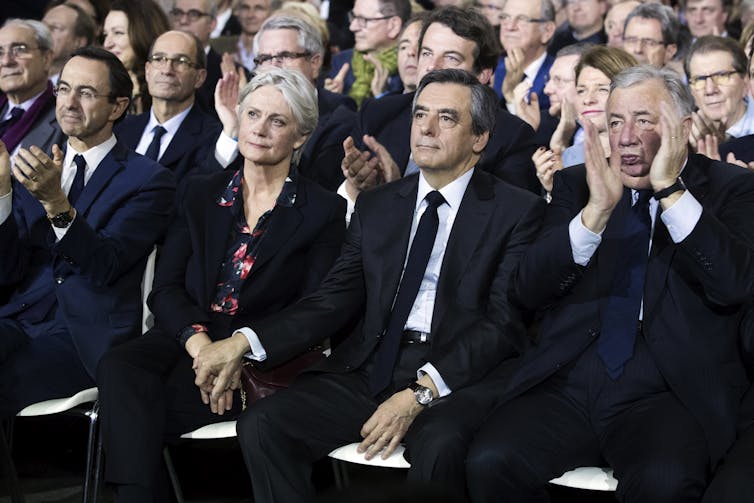French presidential candidate François Fillon has landed himself in a spot of bother, just months ahead of the election he is due to contest for the Republican party. After his surprising but impressive victory in the right-wing primary in November, Fillon seemed a shoo-in for the Elysée Palace, but then came revelations about him employing members of his family. He’s now a candidate in crisis.
The trouble all started on Wednesday January 25, when, with perfect and deliberate timing, the satirical weekly magazine Le Canard enchainé published an article claiming that Fillon’s wife Penelope had worked for her husband as his parliamentary assistant between 1998 and 2002. It said she had earned somewhere between €3,000 and €4,000 a month before going on to work for Fillon’s replacement, Marc Joulaud, from 2002 to 2007 (when Fillon became a government minister) at an increased rate of more than €7,000.
There is nothing in the law to prohibit deputies or senators employing members of their families as parliamentary assistants. Indeed many do. They have a fixed allowance to employ whatever assistants they need and they, not parliament, are regarded as the employer. But the job must be real.
Therein lay the problem. During his party’s primary campaign, Fillon had made capital of the fact that, unlike certain candidates (meaning his main rival Nicolas Sarkozy but also president François Hollande), he had always kept his private life private. His wife stayed out of the spotlight and played no part in his political career. The Welsh-born Penelope showed little enthusiasm to appear in public with her husband even when he won the primary. Something did not quite add up.
Le Canard enchaîné went on to claim that no-one at the National Assembly could remember her working there. Worse, Christine Kelly, author of the only authorised biography of Fillon, said she had never come across any evidence that Mme Fillon played any role as a parliamentary assistant.
Fillon was quick to respond. Live on French TV news on the evening of January 26 he said his wife’s work was largely carried out in his parliamentary constituency in the Sarthe, central France. In what he may have thought looked like an act of good faith, he added that when he left government and became a senator (2005-2007), he had employed his two eldest children to work for him. He defended that choice on the grounds that they were lawyers and therefore qualified to do the specialised work he required of them.
Except the Canard went on to report that neither of them had, at that point, qualified as lawyers. And the sums they were said to be earning were certainly impressive for students in their early twenties, at €3,800 and €4,800 per month (before tax). Again, there is nothing illegal in this. Many doctoral students specialising in politics and history work as parliamentary assistants – but probably not at those rates.
Losing ground
Fillon supporters wanted some sort of explanation. The affair was already having an impact in the opinion polls, with Fillon dropping behind far-right candidate Marine Le Pen and worryingly close to leftist upstart Emmanuel Macron.
Meanwhile, the parquet national financier, the branch of the French judiciary responsible for investigating misuse of public funds, had swung into action the day the allegations were published. On Monday 30 – with the permission of the speaker – police raided the National Assembly. The same afternoon, they interviewed the Fillons, separately.

Despite support for Fillon from party heavyweights, the affair was beginning to have an impact on public opinion. Various polls showed that many voters thought Fillon would not, or should not, continue to stand in the presidential election. It was not just that Fillon may or may not have done something wrong, but also that he had played the “honest man” card while surreptitiously stretching the rules.
And even if what he had done was legal, it hardly played well against his manifesto promises of more austerity, welfare reductions and cutting 500,000 jobs in public services. Suddenly, the emphasis Fillon had placed on family values took on a very different meaning.
Switching up?
In the background, individual Republican parliamentarians were becoming increasingly uneasy with the candidate. Fillon met the party rank and file on the morning of Wednesday February 1 and promised them that the whole matter would be cleared up within a fortnight. He was perhaps confident that he had been able to provide investigators with convincing evidence to have the matter dropped. However, on the same morning, Le Canard enchaîné publicly stated that it was sticking by its original story and publishing further allegations that Penelope Fillon had in fact been her husband’s parliamentary assistant since 1988.
If Fillon had thought he could see out the storm, matters took a turn for the worse the next day when France 2 announced that it had found a copy of a video of a 2007 interview with Penelope in which she said she had never been her husband’s assistant.
The same evening, speaking to an enthusiastic crowd of a thousand supporters at Charleville-Mezières in the north-east of France, Fillon slammed his left-wing opponents and the Paris-based media “microcosme” for obsessing over the story.
But party leaders have begun to look at a plan B. Gérard Larcher, the Filloniste speaker of the Senate, has been charged with finding an alternative candidate for the Republicans. Asked very soon after the story broke if he would be willing stand, Alain Juppé, who crashed out of the primary at an earlier stage than expected, was categorical in his refusal. But if Fillon does withdraw, that might change.
Other names have been mooted. Perhaps François Baroin, a former minister and senator-mayor of Troyes, a longstanding Filloniste touted as a candidate for 2022, or Laurent Wauquiez or Xavier Bertrand – again, men who have mostly been on the shortlist for the next campaign. And what price Nicolas Sarkozy? With only a few weeks until the first round of voting in the election, the Republicans need to move quickly if they are going to replace Fillon.

The other candidates have remained relatively circumspect regarding Fillon’s problems. Le Pen has her own troubles, concerning some €300,000 she has been ordered to (and is refusing to) repay the European parliament following an accusation that she misspent the funds by using European money to pay party staff working on French matters.
The various characters on the left are too busy trying to work out their own relationship – and Macron sees no capital to be made in attacking Fillon. In any case, they really do not need to get involved. The French right, once described by Fillon’s late political mentor Philippe Séguin as “the stupidest right in the world” might be on the point of implosion, all by itself.

